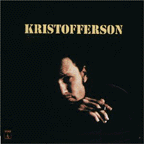![]()
  |

Kristofferson
Kris Kristofferson
Monument AK-44351
Released: 1970
Chart Peak: #43
Weeks Charted: 22
 If Kris Kristofferson had been incorruptible, he might not have been noticed in the crowd of new-style troubadours. Most of his contemporary singer-songwriters are young, innocent, and astringently idealistic, and are, when you come down to it, variations on the style of Tim Hardin -- though usually without Tim's humility. Kristofferson is different. He has been corrupted. Hard times have fractured his idealism as whiskey and tobacco have aged his voice. His songs deal with how it is to feel inadequate. The world is a mess, all right, he concludes, but then so am I. The hero winds up in jail only partly because of his life style and politics -- there also was the matter of his being roaring drunk and raising hell. The South, being so conservative, has always been a tough place for rebels, and Kristofferson has been able to construct a stable of Southern characters -- mostly shades of himself -- to personify actions and reactions that anyone anywhere can identify. Hank Williams, his boyhood hero, knew what it was like to be poor and scrambling in the South (which is pretty much like what it's like anywhere else, only more so) and it got into his songs, too. Like Williams, Kristofferson looks at it with a mixture of sympathy, objectivity, and hope. There used to be Southern-born novelists attuned to such common-man heroism, but they mostly died or turned to writing about sex or money.
If Kris Kristofferson had been incorruptible, he might not have been noticed in the crowd of new-style troubadours. Most of his contemporary singer-songwriters are young, innocent, and astringently idealistic, and are, when you come down to it, variations on the style of Tim Hardin -- though usually without Tim's humility. Kristofferson is different. He has been corrupted. Hard times have fractured his idealism as whiskey and tobacco have aged his voice. His songs deal with how it is to feel inadequate. The world is a mess, all right, he concludes, but then so am I. The hero winds up in jail only partly because of his life style and politics -- there also was the matter of his being roaring drunk and raising hell. The South, being so conservative, has always been a tough place for rebels, and Kristofferson has been able to construct a stable of Southern characters -- mostly shades of himself -- to personify actions and reactions that anyone anywhere can identify. Hank Williams, his boyhood hero, knew what it was like to be poor and scrambling in the South (which is pretty much like what it's like anywhere else, only more so) and it got into his songs, too. Like Williams, Kristofferson looks at it with a mixture of sympathy, objectivity, and hope. There used to be Southern-born novelists attuned to such common-man heroism, but they mostly died or turned to writing about sex or money.
"Sunday Mornin' Comin' Down" was probably the most startling song heard in 1970. It left me almost gasping when I first heard the Johnny Cash version. Kristofferson's voice on this record seems a little overcooked, sounding as if he was afraid to really let us have it. Nevertheless, it is his ultimate statement to date about loneliness, and Kris has made a lot of statements about loneliness. The lament for lost or never-had companions or loves dogs all his songs with the quiet efficiency of a small-town bookkeeper. Many songs also mention being broke and hung over.
Kristofferson is more nearly a country singer than the other singers who have lately embraced country music. His accent is genuine. He's older and was exposed to country music naturally, as a matter of geography. Most of the others were exposed first to rock-and-roll and had to work backwards along one of its branches to find country. The phrasing and pronunciation Kris uses in "Me and Bobby McGee" are not terribly different from what you might hear in the voices of Ferlin Husky, Roy Drusky, or several other unpop-ed country singers. The arrangements in this recording are of the in-between variety so popular these days, using rock but not twangy sounds. But these arrangements are scrupulously subdued; they support Kristofferson without making any bid to become the whole show. They are, in fact, a little light in the support department in a few spots. However, they do more good than harm, and that's rare, and we can thank producer Fred Foster for it. Kristofferson's archetypal whiskey voice -- if you could touch it, you might find its texture like that of a Turkish towl -- is what the record is about, and he isn't so much singing it to you as surrounding you with images that tell tales of hoboes without trains. "Beat the Devil," "Me and Bobby McGee," "Best of All Possible Worlds," "Casey's Last Ride," "Just the Other Side of Nowhere," and "Sunday Mornin'" are spun out to the listener with the assumption that he knows what it's like to be on the bum -- but anyone who has been broke, thirsty, or lonely knows what it's like.
Kristofferson tosses out a better-than-average adage occasionally: "The devil haunts a hungry man," "Yesterday is dead and gone and tomorrow's out of sight," "There's nothing like a woman with her spell of make-believe to make a new believer of a man." But his lyrics don't have the gloss of self-conscious surrealism that so many other songwriters picked up by listening to Bob Dylan. Kristofferson's lyrics are straightforward and, in their way, generally graceful. Compare his songs with those of writers ten years his junior, those who are trying to say the same things, and you can see how experience -- and even an Oxford education -- can be helpful.Kristofferson says he wants to affect people emotionally rather than intellectually -- but any songwriter interested in survival wants to do that. The thing is that in order to write well for the viscera, one must have his own cerebrum in order, otherwise he won't know how thick to pour it on. Kristofferson, on this album, poured it on just about right.
- Noel Coppage, Stereo Review, 4/71.
Bonus Reviews!
Kristofferson's reputation has been building in the underground. Asked to do some songs for the already legendary new Dennis Hopper movie, Kristofferson hung around the Peruvian shooting location long enough to appear in a scene or two. It seems to be a pattern. Apparently Kristofferson was around the Johnny Cash television show long enough to make an impression on Cash (and, in turn, to have Cash's singing style have its effect upon him, too).
Except in a few instances, however, Kristofferson's charm eludes me. He sounds just a bit too much like a second-string Cash singing second-string John Hartford songs. With some exceptions -- especially a moving, on-the-road story called "Me and Bobby McGee."
Kristofferson may very well turn out to be as large a talent as his already large reputation would have us believe. But I'm still from Missouri.
- Don Heckman, Stereo Review, 9/70.
Originally released before Kristofferson's recording success, the LP has been repackaged and reserviced and with what many consider the definitive versions of his own "Me and Bobby McGee," "Help Me Make It Through the Night," "For the Good Times," "Sunday Morning Comin' Down" could become one of the more successful of his albums.
- Billboard, 1971.
Further reading on Super Seventies RockSite!: |
- Robert Christgau, Christgau's Record Guide, 1981.
This classic first album from Kristofferson showcases his versions of songs made famous by others. While he sometimes went to extremes to get these songs heard in the first place (landing a helicopter in John Cash's yard in an effort to get the singer to hear his songs), this album should not be missed by anyone who's ever liked any of these songs. Once Monument realized what a talent they had, they reissued this record as Me and Bobby McGee.
- Jim Worbois, The All-Music Guide to Rock, 1995.
In the late 60s and early 70s, Kris Kristofferson's adult, reality-based songs were the most shocking thing to hit Nashville in a long time, and what's more, they were hits. This album contains his own versions of some of the best, including the title song, "Help Me Make It through the Night," and "Sunday Mornin' Comin' Down."
- William Ruhlmann, The All-Music Guide to Rock, 1995.
This is a bitchin' alt-country, must-have debut by one of the outlaw genre's most important songwriters whose eloquent lyrics and heartfelt performances helped Nashville make it through the night and reach into the modern era. Swooning over his smoky voice and sexy arrangements, diehards declare tunes like "Me and Bobby McGee" and hangover song "Sunday Mornin' Comin' Down" to be great poetry that changed the genre. * * * *
- Zagat Survey Music Guide - 1,000 Top Albums of All Time, 2003.
![]() Reader's Comments
Reader's Comments
No comments so far, be the first to comment.
